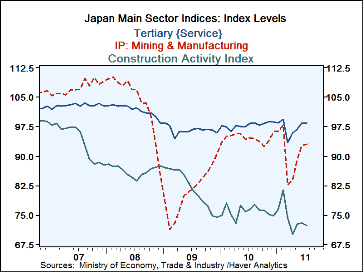 Global| Sep 21 2011
Global| Sep 21 2011Japan's Sector Indices are Mixed
Summary
After its series of disasters Japan was expected to provide a shot of growth for the global economy as it was re-built. But the rebuilding effort is not pushing ahead with strength. One unexpected outcome has been the European debt [...]
 After its series of disasters Japan was expected to provide a shot of growth for the global economy as it was re-built.
But the rebuilding effort is not pushing ahead with strength. One unexpected outcome has been the European debt
crisis on the heels of Japan’s natural disasters. This has raised the perception of risk in the world slowed global
growth, contributing to an environment in which the yen has moved up strongly. This move in the yen has undercut
the rebuilding effort in Japan.
After its series of disasters Japan was expected to provide a shot of growth for the global economy as it was re-built.
But the rebuilding effort is not pushing ahead with strength. One unexpected outcome has been the European debt
crisis on the heels of Japan’s natural disasters. This has raised the perception of risk in the world slowed global
growth, contributing to an environment in which the yen has moved up strongly. This move in the yen has undercut
the rebuilding effort in Japan.
Of course, yen-strength has no impact on disaster relief but this new twist in the form of unexpected yen strength has a number of Japanese firms wondering if they want to rebuild in Japan at all if the yen is going to remain so strong. The government has even started to offer construction incentives for firms that would build factories in Japan.
Still the construction sector has not had much of any rebound from the lows it hit earlier this year. Construction has been locked in long secular decline.
Japan’s manufacturing sector has sprung back after the disasters and so has services. But in each case the rebound leaves the activity measure below its respective pre-crisis peak. Moreover, the rebound seems to have gone flat and lost its momentum, undoubtedly with the strength in the yen having become a factor.
As a result the outlook for Japan is once again clouded. Japan’s exports have disappointed. Japan needs some export led growth like never before. There is, of course, a certain measure of domestic rebuilding that will kick into gear regardless, but Japan is now a struggling economy with a large burden of domestic rebuilding and a huge national debt at a time that there is a lot of concern about debt to GDP ratios. There is also a slowing in international demand, a blow to an economy that is still export-dependent.
Japan has its work cut out for it. Europe is floundering. The UK is losing its affinity for austerity as its economy is stuck in a quagmire. The US economy is slowing and the IMF is warning Europe to do more to get its act together. All in all it is a picture of troubled international economy where local economies while joined at the hip through trade and capital flows seem to have conjured up unique local problems that will keep them very busy and keep risk levels elevated for some time yet.
| Up to Date Japan Industry Survey | ||||||||||
|---|---|---|---|---|---|---|---|---|---|---|
| Recent Months | Moving Averages | Extremes; Range | Rank Standings |
|||||||
| Jul 11 |
Jun 11 |
May 11 |
3Mo | 6Mo | 12Mo | Max | Min | %-ile | %-ile | |
| All Industry | 96.6 | 96.2 | 94.1 | 95.6 | 94.5 | 95.4 | 103.4 | 90.0 | 49.3% | 58.0% |
| Construction | 72.5 | 72.9 | 72.7 | 72.7 | 74.0 | 75.0 | 136.7 | 70.1 | 3.6% | 0.5% |
| Mining and MFG | 93.0 | 92.6 | 89.2 | 91.6 | 89.9 | 92.2 | 110.1 | 71.4 | 55.8% | 26.9% |
| Tertiary | 98.4 | 98.5 | 96.8 | 97.9 | 97.1 | 97.7 | 103.5 | 90.8 | 59.8% | 72.6% |
| Ranges, Max, Min and ranking standings since 1993 | ||||||||||
Robert Brusca
AuthorMore in Author Profile »Robert A. Brusca is Chief Economist of Fact and Opinion Economics, a consulting firm he founded in Manhattan. He has been an economist on Wall Street for over 25 years. He has visited central banking and large institutional clients in over 30 countries in his career as an economist. Mr. Brusca was a Divisional Research Chief at the Federal Reserve Bank of NY (Chief of the International Financial markets Division), a Fed Watcher at Irving Trust and Chief Economist at Nikko Securities International. He is widely quoted and appears in various media. Mr. Brusca holds an MA and Ph.D. in economics from Michigan State University and a BA in Economics from the University of Michigan. His research pursues his strong interests in non aligned policy economics as well as international economics. FAO Economics’ research targets investors to assist them in making better investment decisions in stocks, bonds and in a variety of international assets. The company does not manage money and has no conflicts in giving economic advice.






